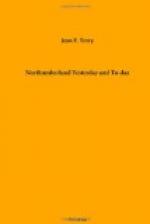Douglas rushed into the thickest of the fray, and Hotspur tried to find him, but in the dim light that was difficult, especially as Douglas had, in his haste, come to the fight without helmet or breastplate. Presently he was borne to the ground by three English spears; and as he lay guarded by his faithful chaplain, Sir John and Sir Walter Sinclair, with Sir James Lindsay, came upon him. “How fare you, cousin?” asked Sir John. “But poorly, I thank God,” answered Douglas; “for few of my ancestors died in bed or chamber. I count myself dead, for my heart beats slow. Think now to avenge me. Raise my banner and shout ‘Douglas!’ and let neither my friends nor my foes know of my state, lest the one rejoice and the other be discomforted.” His dying commands were obeyed; and while his battle-cry was raised anew, his dead body was laid by a “bracken bush,” and the fact of his death concealed from friend and foe alike. The furious onslaught of the Scots now carried all before them; and Hotspur fell a captive to the sword of Sir Hugh Montgomery, a nephew of Douglas, after a fierce hand-to-hand encounter. The two chief English leaders being captured, the day, or rather the night, was with the Scots, in fulfilment of an old prophesy that “a dead Douglas should win a field.”
“This deed was done at Otterbourne
At the breaking of the day;
Earl Douglas was buried at the braken
bush,
And the Percy led captive away.”
When the fray was over, the two sides treated their captives with knightly courtesy, many being allowed to go to their homes until they recovered from their wounds, on giving their word of honour to send the amount of their ransom, or themselves return to their captors.
The Bishop of Durham, immediately after having had some refreshment at Newcastle, had set out to join the Percies; but as he and his men neared Otterburn, they met so many fugitives who gave them anything but reassuring accounts of the fortunes of their friends, that half of his force melted away, and the Bishop had perforce to return to Newcastle; it was scarcely to be expected, indeed, that everyone should have that thirst for hard blows which distinguished the knights and their immediate followers. The Bishop, however, made one capture—Sir James Lindsay, who had ridden so far in pursuit of Sir Matthew Redman that he found himself amongst the force advancing under the leadership of the warlike prelate.
When the Scots retired from their camp, they took the body of Douglas from the “bracken bush” where it lay, and carried it away for burial in Melrose Abbey; and Hotspur, as the price of his ransom, built a castle for Sir Hugh Montgomery.
After this there was peace on the Borders for the next ten years or so, when the game began again as merrily as ever. When Sir Thomas Gray was absent from his castle of Wark-on-Tweed, attending Parliament, the Scots came down upon it and carried off his children and servants. Sir Robert Umfraville met and checked another company that were harrying Coquetdale. In the year 1400, Henry Bolingbroke himself led an army to Edinburgh; but a guerilla band of Scots, avoiding his line of march, stole behind him and ravaged Bamburghshire.




